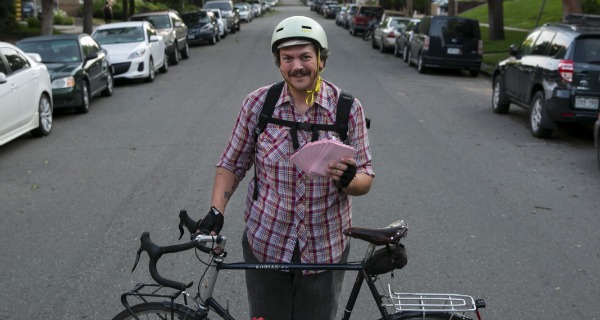
Maybe you've read about Mathias Svalina in the Denver Post or heard him on NPR: He's that guy who's been riding his bike around town, delivering dreams he writes to subscribers every morning. This fall, he'll also be delivering lessons, in class form, as one of our newest Lighthouse instructors. I caught up with him recently to ask a few questions, and I promise: you won't catch yourself nodding off to his answers, below:
Q. You have a dream delivery service! Can you tell me a little bit about why you started it? And what keeps you motivated to write and deliver those dreams every day?
A. Sure! Thank you for asking! In one sense, I started the Dream Delivery Service because I wanted to create a relationship with a reader that would happen differently than a book, a relationship that would develop incrementally over a month and rely on a slower, more relationally porous intimacy.
In another sense, I started the Dream Delivery Service because I was broke and somehow it seemed like the best possible solution to being broke. (Side note: It was not an effective solution to being broke.)
I have rarely had a problem motivating myself to write the 20-40 dreams I write most days. Writing dreams is an uncomplicated joy, more like a natural extension of my mind than like work. The dream-writing taps into a thing my mind does regardless of whether I’m writing, a relentless enstrangifying of the world.
Q. You’ve also written five books of poetry, and your work has been published and anthologized. Do you work on your own work while also doing the dream service? Or do you have to hold off on your own work until the “off-season”?
A. I don’t really have time to work on what becomes my books when I’m doing the Dream Delivery Service. I often joke that I’m writing so much that I never have time to write. But it has also given me a different relationship to the stories and poems I work on, a slower and more careful approach. So when, as I do right now, I have free time to work on them, I approach them with more intentionality and more direct goals.
It feels a bit like I’ve identified the writing process that works as play and self-medication and the writing process that is more work-like and goal-oriented—and I’ve separated them. You’ll have to stay tuned to see if separating them turns out to be a good idea or not!
Q. Who are some of your favorite writers? Any particular book or writer that really inspired you to write or pushed your writing in a new direction?
A. My creative writing teacher in college, William Henry Lewis—an amazing short fiction writer whom you should read, gave me a copy of Eduardo Galeano’s The Book of Embraces and that book has been an ongoing touchstone for me. Galeano’s vignette form, the fluidity between reality and the fabulist, the constant sense of an unspoken depth of emotion, I love it. I think his work is instructive for any writer who is trying to refine their craft and expand the scope of their relationship to the world.
I did not read Lucille Clifton’s work deeply until after she died, which was awful of me. I had read many of her poems in anthologies and saw her read a few times and read a few of her books. I didn’t read her comprehensively until [The Collected Poems of Lucille Clifton] was posthumously published. That was the last life-altering reading experience I can recall: the range and depth of her mind and world, and how her poems both tracked and trailblazed for that mind; the direct attention & the depth of experience. Reading those collected poems was inspirational. It changed the way I thought about my goals as a writer, my hopes of making sense of the world with a reader. She is another writer whom I think any writer can learn from.
Q. You’re teaching an intro to poetry workshop for our Late Summer Session, and you also teach writing at the University of Colorado. What interests you about teaching? What’s your approach to working with poetry beginners?
A. I love teaching. I love the process of reading alongside eager and searching writers, reading both their own work and others’ work. I love the chance every class gives to reexamine basic questions about writing, why we write, why we write about what we write, how to write with more of ourselves.
My approach to poetry beginners is to explore what they can say that no one else can say. This is a different process and journey for each writer. It can be emotional, technical, educational, or any number of other things. And I feel good when I can be part of that journey. I try to assist this, to be a fellow traveler in the process rather than an authoritative instructor who requires preconceived and regimented products from each writer. I want a writer to find what good poetry means to them and delve into that, rather than have me impose my ideas of what good poetry means.
Mathias Svalina will also be teaching our Intermediate Poetry Workshop and Writing as Ritual: Building a Daily Writing Practice during our Fall Session, which will open for registration September 7.

